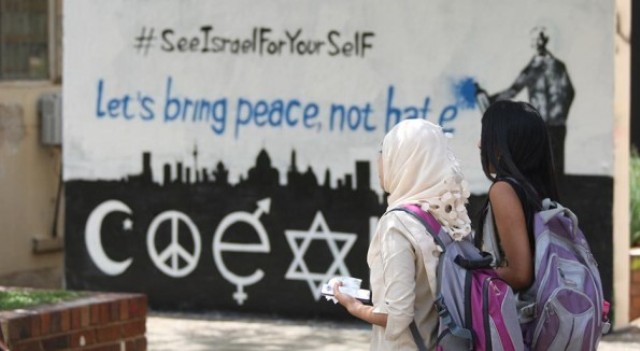South Africans, who have first hand knowledge of what apartheid really is and are familiar with the reality in Israel, reject the comparison between Israel and the apartheid regime.
A South African youth leader has strongly rebuked the charge that Israel is an apartheid state and called on activists to stop appropriating the term when describing its conflict with the Palestinians, The Times of Israel reported Monday.
Nkululeko Nkosi, 23, is a member of Africans for Peace, a self-described “collective of independent students, scholars and activists who bring an African lens to the global debate on peace and stability on our continent and around the world,” which includes the Israeli-Palestinian conflict.
Nkosi is also the Wits University Branch Chairman of the African National Congress Youth League, and once believed that Israel was an apartheid state. But after visiting the country and closely studying the issues, he has reached the opposite conclusion.
A South African’s Opinion
In a briefing published by Africans for Peace last November, Nkosi argued that, as victims of apartheid, black South Africans are the best positioned to determine whether or not Israel qualifies as an apartheid state. His position is unequivocal: “Arab citizens of Israel enjoy the same rights and freedoms as Jewish Israelis. On my last trip to Israel, I found that unlike apartheid South Africa, there is no deliberate effort by the government to segregate a specific group in Israel. In day-to-day discussions with ordinary Israeli citizens, I learned from Arabs and Jews, and I sensed their burning desire to live together as harmonious neighbors. In apartheid South Africa, Afrikaners disdained black South Africans, and these sentiments are still in evidence today.”
In Israel, there is a free press and universal suffrage, unlike in apartheid South Africa, Nkosi noted. “The apartheid government would not have allowed a person of color to hold any position of influence, while in Israel, Arabs are found in the highest ranks of political, civil, and even military life.”
“Please – don’t steal the word ‘apartheid’!…Those who apply the term ‘apartheid’ to the Israeli-Palestinian impasse are guilty of perpetuating that same theft, by denying the uniqueness of the racism and hatred that we faced, and which we have overcome with much blood and tears,” Nkosi stressed.
Disregarding the Facts
Benjamin Pogrund, an activist who was jailed for opposing the apartheid regime in South Africa, wrote in The New York Times last month that Israel “is nothing like South Africa before 1994. Those who accuse Israel of apartheid — some even say, ‘worse than apartheid’ — have forgotten what actual apartheid was, or are ignorant, or malevolent.”
“South African apartheid rigidly enforced racial laws,” Pogrund observed. “Israel is not remotely comparable. Yet the members of the BDS movement are not stupid. For them to propagate this analogy in the name of human rights is cynical and manipulative. It reveals their true attitude toward Jews and the Jewish state. Their aims would eliminate Israel. That is what’s at stake when we allow the apartheid comparison.”
South African human rights activist Tshediso Mangope drew upon the history of his country in order to refute many common criticisms of Israel, such as that it is an apartheid state, in a December 2016 article in The Tower Magazine.
Jews, Mangope noted, are not foreign conquerors of Israel, but rather its indigenous people; no one could reasonably argue that “returning to your ancestral homeland from whence you were displaced makes you a settler.”
He also pointed out that while black South Africans had support from surrounding nations in their struggle, Israeli Jews historically have been shunned by their Arab neighbors, most of whom at some point have “vowed to wipe Israel off the map.”
While the central goal of black South African activists was peaceful coexistence, “most Palestinians refuse to recognize Israel’s right to exist,” and even “essentially supported the call for the genocide of Jewish people,” Mangope noted. He concluded by writing that “the only way to protect Jewish people from all the hardships they have suffered the world over is to defend their inalienable right to self-determination” in a Jewish state.
Maj. Alaa Waheeb, the highest ranking Muslim officer in the IDF, wrote an op-ed in the Jewish News in March 2016 expressing pride in the role he plays in Israeli society. He recounted being on a speaking tour of the United Kingdom with a Jewish medic: “We were the Muslim who protects Jewish lives, and the Jew who saves Muslim lives. There’s only one country in the Middle East that could produce a couple like that – and it sure as hell isn’t an apartheid state.”
By: The Tower
